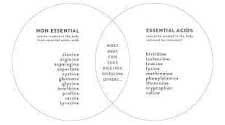Essential Amino Acids: Protein Sparing Effects of BCAA's & Muscle

Essential Amino Acids are Key to Protein Sparing
Branched-chain amino acids (BCAAs) -leucine,isoleucine andvaline - are deemed essential, which means they must be supplied
by one's diet, because they can't be synthesized from other amino acids in the body. Most amino acids are metabolized in the
liver, BCAAs are metabolized directly in muscle.
Among other functions, BCAAs act as nutritional precursors to glutamine synthesis in muscle. This is significant because
glutamine is the key amino acid involved in muscle-protein synthesis, BCAAs can also contribute to energy- production. In
fact, after extended exercise (over four hours), a protein is enacted that begins to contribute about 10-15% of calories to
energy production and this protein is derived primarily from muscle BCAAs.
Several studies have confirmed the capability of BCAAs. This is of particular interest during David Dearth gets his aminos
going conditions of large-scale nitrogen loss, with a fierce which occur during extreme instances preacher curl such as
postoperative recovery or weightlessness during space flight.
To test the effects of weightlessness, scientists often use a bed-rest model. A recent study looked at the effects of BCAA
supplements on protein nutrition using such a model. The study divided 12 subjects into two groups. Six stayed in bed,
simulating the effects of weightlessness on muscle protein; the other six were active. The bedridden group took one of two
amino-acid batches: a combination of serine, glycine and alanine, or BCAAs. Results showed that those taking the BCAA
supplements didn't lose body protein.
Another study, published in the journal Metabolism (44:424-429, 1995), looked at the effects of BCAAs supplied over 16 hours.
The study analyzed 10 subjects who fasted and a control group who ingested salt as a placebo. Results confirmed that BCAAs
promote a sustained sparing of muscle protein. However, this study indicated no increase in muscle-protein synthesis.
Those who favor sustained aero protein-sparing exercise sessions should probably take supplemental BCAAs. The protein loss that
occurs when extended daily aerobic sessions are combined - with low-calorie diets comes mainly at the expense of BCAAs in muscle.
Consuming extra amounts of these aminos may therefore act as a brake on muscle-tissue loss.